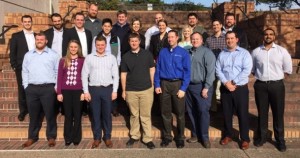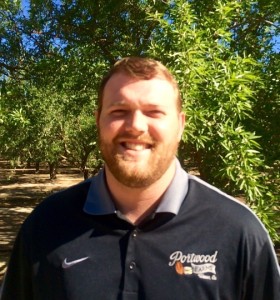Meet The New Almond Board Leadership Program Participants

The Almond Board Leadership Program Class of 2016
Photo: Almond Board of California
The 21 participants chosen for the Almond Board of California’s Almond Leadership Program for 2016 met for the first time earlier this year for their program orientation and kickoff activities.
When they complete the program, the California almond industry will be enriched by the addition of 21 members poised to become leaders. The program, designed to provide a comprehensive education about the almond industry, will include events addressing topics such as production, processing, and marketing, among others.
Throughout the year, class members will have the support of a member from within the industry, who will serve as their mentor. Participants will also gain valuable insight into the California almond industry as well as through job shadowing.
The members of the Almond Leadership class of 2016 and their mentors are:
- Ashley Bandoni, Syngenta; mentor: Randy Layne, Fresno Madera Farm Credit
- Joseph Barnett, Blue Diamond Growers; mentor: Todd Meyer, Western Nut Company
- Daniel Chui, Trinitas Partners; mentor: Jordan Phippen, Pacific Coast Sales
- Rory Crowley, Nicolaus Nut Co.; mentor: Todd Meyer, Western Nut Company
- Chad Cummings, JKB Energy; mentor: Ladd Hackler, JenJil Packaging
- Blake Davis, Pacific Gold Agriculture; mentor: Chuck Dirkse, La Mancha Orchards
- Scott Donald, Pearl Crop; mentor: Mike Ratto, retired ABC field representative
- Rita Edwards, Coldwell Solar; mentor: Brian Dunning, Blue Diamond Growers
- Sarah Gooder, Wonderful Orchards; mentor: Brendan Feder, Agricultural Investments unit of MetLife
- Jarred Hettinger, Jackrabbit; mentor: Tommy Tickenoff, V-V Enterprises
- Mallvinder Kahal, Kahal Farms; mentor: Ryan Cosyns, Cosyns Farms, Madera
- Michael Locke, CH Farming; mentor: Dave Richmond, Braden Farms
- Ethan Nicol, Portwood Farms; mentor: Kent Stenderup, Stenderup Ag Partners
- Edgar Perez, Crop Production Services; mentor: Carlos Arellano, Hilltop Ranch
- Angie Raimondi, Blue Diamond Growers; mentor: Lori Coburn, Hughson Nut
- Wes Romero, The Almond Company; mentor: Stan Chance, Yosemite Farm Credit
- Chris Taylor, Bayer CropScience; mentor: Danielle Lightle, UC Cooperative Extension farm advisor, Glenn, Butte and Tehama counties
- Jason Thomas, Syngenta; mentor: Emily Symmes, area IPM advisor, UC Cooperative Extension, Butte, Colusa, Glenn, Sutter, Tehama and Yuba counties
- Miguel Vasquez, Sierra View Ranch; mentor: Martin Pohl, Hughson Nut
- Robert Willmott, CSU Fresno; mentor: Darren Rigg, Meridian Nut Growers
- Brandon Windecker, Olam Farming; mentor: Jared Britschgi, Pearl Crop

Ethan Nicol
Program participant Ethan Nicol handles crop protection, nutrient management, irrigation scheduling, and safety coordination at Portwood Farms, a family business based in Wasco, CA. We caught up with him to learn about why he chose to participate in the program, as well as his aspirations and goals for the future:
Q: How long have you been involved in the family business?
Nicol: I began working for the family farm while I was in high school, performing general farm labor tasks. Upon graduation from Fresno State University in 2012, I was hired on full time with Crop Production Services, Madera, as a PCA from 2012-2014. In May 2014, Phil Portwood gave me a call asking if I was interested in coming back to the farm to help manage. Eager to get back to Kern County, I thought it would be a great opportunity to get myself directly involved with all facets of the farming process, expanding my focus from crop protection and fertility.
Q: How did you become interested in the almond industry?
Nicol: Growing up in Wasco, my house has been surrounded by almond orchards for as long as I can remember, which I think is where my passion for the almond community is rooted. When working for Crop Production Services while in school, almonds were the primary crop I scouted. This gave me an excellent opportunity to learn the fundamentals of the crop and gain a basic understanding of the economic benefits of the almond industry. That is when my true affinity for almond production began and when I felt like it was an industry in which to focus my career.
Q: Why did you decide to apply for the Almond Leadership Program?
Nicol: Being a new member to the almond community, I felt it was an excellent opportunity to put myself on the frontlines of receiving new information within the industry that I could take home and put into practice in our operation. I also saw an opportunity to form a relationship with the Almond Board of California and establish many other professional contacts throughout the industry that I will be able to work with and benefit from throughout my career.
Q: What do you hope to gain from the program?
Nicol: Apart from the opportunity to make industry contacts, I really wanted to gain insight to the industry as a whole. Being on the farming side of the industry, we spend a vast amount of energy focusing on factors influencing production, like soil fertility, irrigation management, and crop protection. The Almond Board Leadership Program has expanded my scope of insight into areas of the industry I don’t get to work in on a daily basis, such as factors influencing foreign and domestic markets, emerging markets, state and federal regulations, and research and development on the nutritional benefits of almonds.
Q: What do you think are some of the biggest challenges facing the almond industry today?
Nicol: In my opinion, water availability and quality are the single greatest challenges facing not only the almond community but the agricultural industry as a whole in California. This is especially true in the Southern San Joaquin Valley, where a chronic lack of support from the state in the form of surface water has forced growers to rely heavily on groundwater pumping. Combined with the drought, this has resulted in depleted aquifers with poor water quality. This has and is going to continue to make water increasingly difficult to get, thus more expensive and generally requiring treatment before it can be used.
The closing of the biomass cogeneration plants up and down the state is also causing quite the stir in the almond community. In the past, when growers would remove an orchard, they could sell the wood chips to the cogeneration plants to be converted into green energy. This was an excellent use of the resource and made orchard removal cost-friendly for the growers. However, with the closing of the plants, growers are now faced with a question of what to do with the wood chips after orchard removal. While there is exciting new research being done to assist growers in finding a sustainable solution, none are going to be as cost-friendly as the cogeneration plants.
Q: Is there anything you’d like to add?
Nicol: The almond community in California is full of wonderful people and families who genuinely care about the crop they grow and distribute, as well as the people who are consuming it.









